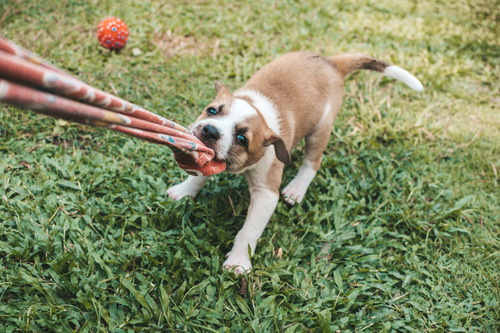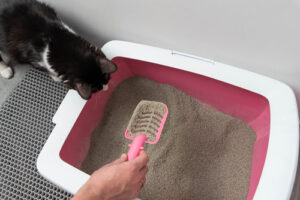Understanding the development of your puppy’s teeth is essential for ensuring their dental health and overall well-being. Just like humans, puppies also go through a phase of losing their baby teeth. This period can be a curious and sometimes challenging time for both the puppy and their owner. At Montgomery Veterinary Associates in Montgomery, AL, we’re committed to providing valuable insights to help you answer the question, when do puppies lose their baby teeth? If you have any concerns or questions, or if you need to schedule a dental check-up for your dog, feel free to reach out to us at our Vaughn Road location at (334) 271-1003 or our Carter Hill location at (334) 269-2508. You can also request an appointment online for your convenience.
Understanding Puppy Teething
The teething phase in puppies is a critical period that marks their transition from milk teeth to adult teeth. Generally, this process starts when puppies are about three to four months old and is usually completed by the time they reach six to seven months. Here’s a more detailed look at what pet owners can expect during each phase of puppy teething:
The Early Stage (3-4 months)
At around three to four months of age, your puppy will begin to lose their baby teeth, or milk teeth, starting with the incisors which are the small teeth at the front of the mouth. During this phase, you might notice your puppy biting and chewing more frequently as their gums may be sore and the chewing helps to loosen the baby teeth. It’s a good time to introduce appropriate chew toys to help ease their discomfort.
The Transitional Phase (4-6 months)
This is when the majority of teething happens. After the incisors, the canine teeth (the sharp, pointed ones) and premolars start to come in. Your puppy may experience more discomfort during this stage, leading to increased chewing, drooling, and sometimes a slight change in eating habits. It’s essential to keep an eye on your puppy to ensure they are not chewing on inappropriate items. Offering frozen treats or special teething toys can provide some relief.
The Final Stage (6-7 months)
By six to seven months, most puppies will have almost all of their adult teeth, totaling around 42 teeth. The last to emerge are usually the molars, which are not replaced because puppies do not have baby molars. At this stage, the intense chewing usually begins to subside. However, this is a crucial time to start good dental hygiene practices, like regular brushing, to maintain the health of their new adult teeth.
Monitoring and Care
Throughout the teething process, it’s important to monitor your puppy’s teeth to ensure they are developing correctly. Sometimes, a puppy may retain some baby teeth, which can lead to dental problems. Regular dental check-ups at Montgomery Veterinary Associates can help in identifying and resolving such issues early on. If you notice any irregularities or if your puppy seems to be in excessive discomfort, it’s always best to consult with our veterinarians.
Signs of Teething in Puppies
Recognizing the signs of teething can help you better support your puppy through this phase. Common indicators include:
- Increased chewing
- Drooling
- Minor redness or swelling of the gums
- Changes in eating habits
- A slight rise in irritability
- Finding tiny teeth around your home
If you’re concerned about your puppy’s teething or notice any unusual symptoms, don’t hesitate to contact us.
Supporting Your Teething Puppy
Supporting your puppy during teething is key to their comfort and dental health. Providing safe, puppy-specific chew toys can greatly help in soothing their gums. It’s also important to keep dangerous objects out of reach, as teething puppies tend to chew on almost anything. Incorporating gentle dental care into their routine, like brushing their teeth, can set a foundation for good oral hygiene. For more personalized advice on caring for your teething puppy, our team at Montgomery Veterinary Associates is just a phone call away. We can provide guidance tailored to your puppy’s specific needs.
The Importance of Dental Health and Professional Care
Maintaining your puppy’s dental health is crucial for their overall development. Regular dental check-ups at Montgomery Veterinary Associates can help identify and address any potential dental issues early on. Professional cleaning is also an important aspect of dental care, which can prevent problems like gum disease or tooth decay.
When to Seek Veterinary Assistance
It’s essential to know when to seek veterinary assistance during your puppy’s teething process. If you notice any concerning symptoms like excessive drooling, lack of appetite, swollen gums, or if your puppy seems to be in pain, it’s time to contact Montgomery Veterinary Associates. Our experienced veterinarians can provide the necessary care and advice to ensure your puppy’s dental health is on the right track. Remember, early detection and intervention can prevent more serious dental issues in the future. Don’t hesitate to reach out to us for any concerns related to your puppy’s teething or overall health.
Contact Montgomery Veterinary Associates for All Your Puppy’s Dental Needs
Teething is a significant milestone in your puppy’s development, and understanding this process can help you provide the best care for your furry companion. Remember, if you have any concerns or questions about your puppy’s dental health, the team at Montgomery Veterinary Associates is here to help. Feel free to contact us at our Vaughn Road location at (334) 271-1003, our Carter Hill location at (334) 269-2508, or request an appointment online. Your puppy’s health and well-being are our top priority, and we’re dedicated to providing the best care possible.






